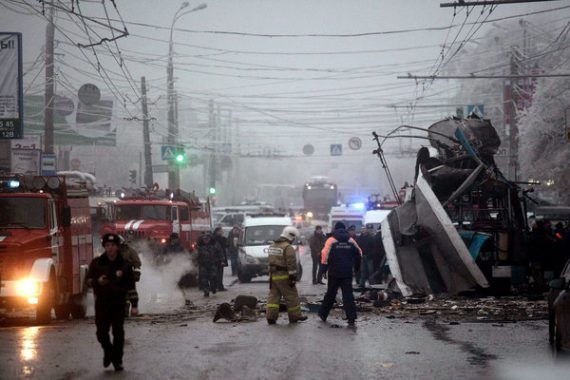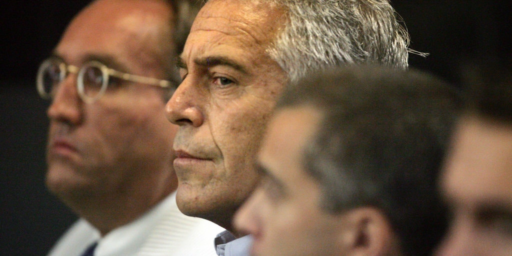Second Suicide Bombing In Two Days Hits Southern Russia As Olympics Approach
We’re just over a month away from the opening of the 2014 Winter Olympics in Sochi, Russia and the explosion of a second suicide bomb in areas near the location of the games is starting to raise security fears:
MOSCOW — A deadly suicide bombing at a crowded railroad station in southern Russia on Sunday, followed by a blast in a trolley bus on Monday in the same city, raised the specter of a new wave of terrorism six weeks before the Winter Olympics in Sochi.
President Vladimir V. Putin’s government has worked to protect the Olympics with some of the most extensive security measures ever imposed for the Games. But the bombings, in Volgograd, underscored the threat the country faces from a radical Islamic insurgency in the North Caucasus that has periodically spilled into the Russian heartland, with deadly results.
Security has become a paramount concern at all major international sporting events, especially in the wake of the bombing at the Boston Marathon in April, but never before has an Olympic host country experienced terrorist violence on this scale soon before the Games. And would-be attackers may have more targets in mind than the Russian state.
Current and former American law enforcement and intelligence officials said Sunday that they were more concerned about security in Russia during the Sochi Games than they have been about any other Olympics since Athens in 2004.
Russian officials attributed the explosion on Sunday to a bomb packed with shrapnel, possibly carried in a bag or backpack. It was detonated in the main railroad station in Volgograd, a city 550 miles south of Moscow and 400 miles northeast of Sochi. The bomb blew out windows in the building’s facade and left a horrific scene of carnage at its main entrance. At least 17 people were killed, and nearly three dozen others were wounded, some of them critically, meaning the death toll could still rise.
On Monday morning a blast struck a trolley bus in the city, killing at least 15 people, including an infant, according to preliminary reports. Photographs posted by Russian news organizations showed that the force of the blast tore open the bus and shattered windows nearby. Nearly two dozen others were wounded in what officials immediately described as a suicide bombing.
The Sunday blast, captured on a surveillance video camera from across the central plaza in front of the station, occurred near the station’s metal detectors, which have become a common security fixture at most of Russia’s transportation hubs. That raised the possibility that an attack deeper inside the station or aboard a train had been averted.
Vladimir I. Markin, a spokesman for the main national criminal investigation agency in Russia, called the railway station bombing an act of terror, though the exact motivation, target and perpetrator were not immediately clear. Within hours of that attack, the authorities blamed a suicide bomber, and cited the gruesome discovery of the severed head of a woman, which they said could aid in identifying her as the suspect. Officials later said they had found a grenade and a pistol, and suggested that the attack might have been carried out by a man and a woman working together.
“Most likely, the victims could have been much higher if the so-called protective system had not stopped the suicide bomber from getting through the metal detectors into the waiting room, where there were passengers,” Mr. Markin said in a statement on the agency’s website.
Volgograd was also the scene of a suicide bombing in October, when a woman identified as Naida Asiyalova detonated a vest of explosives aboard a bus in the city, killing herself and six others.
In that case, the authorities said she was linked by marriage to an explosives expert working with an Islamic group in Dagestan, a republic in southern Russia where the police have struggled to suppress a Muslim separatist insurgency. A month later, the authorities announced that they had killed her husband and four others in a raid. But the attack on Sunday indicated that the threat was far from extinguished
Volgograd, of course, is the city formerly known as Stalingrad (and before that, as Volgorad under the Czars), the site of the one of the longest and bloodiest battles of the Second World War. While it’s unclear why Volgograd itself is becoming a target, it’s fairly clear what is motivating the attacks, and who is responsible for them:
The autonomous republics of the North Caucasus, including Dagestan and Chechnya, have been roiled for nearly two decades by armed insurgencies — complex, ever-shifting conflicts that the International Crisis Group recently called “the most violent in Europe today.” The violence has claimed hundreds of lives this year, prompting the Russian authorities to make extraordinary efforts to keep it from reaching Sochi, a resort city on the Black Sea coast among the foothills of the Caucasus. The city will effectively be locked down starting Jan. 7, with all traffic banned except officially registered vehicles. Visitors to the Olympics, which begin on Feb. 7, will be required to obtain a special pass to enter the region.
With security so tight at the site of the Games, experts have warned that insurgents who want to disrupt the Olympics might turn instead to “softer” targets elsewhere. On Friday, an explosion in a car killed three people in Pyatigorsk, another city in the Caucasus; details of that attack remain sketchy, and it was not clear whether it was related to the bombings Sunday and Monday.
Doku Umarov, the Chechen rebel fighter who now leads a terrorist group known as the Caucasus Emirate, vowed in July to attack in Sochi, calling the Games “satanic.”
“They plan to hold the Olympics on the bones of our ancestors, on the bones of many, many dead Muslims, buried on the territory of our land on the Black Sea,” Mr. Umarov said in a video. He emerged from the ruins of Chechnya’s separatist movement, which was largely defeated by the authorities under Mr. Putin. His group has claimed responsibility for two suicide bombings in Moscow in 2010 and 2011; like the Volgograd attacks, they were both against transportation-related targets.
One reason American law enforcement and intelligence officials are concerned about Sochi is that the United States has more of an arms-length relationship with Russia than with most Olympic host countries. The United States provided extensive security resources to the Greek government in 2004, but the Russians have stronger capabilities than Greece and almost always refuse American offers of help.
Rick Nelson, a former counterterrorism official in the George W. Bush administration, pointed out that the Athens games came relatively soon after the Sept. 11, 2001, terrorist attacks.
“The Greeks did not have the resources and ability to provide a lot of internal security, there were a lot of high-profile targets that were spread out, and Al Qaeda was looking for a high-profile target,” he said. “But there weren’t a series of attacks in Greece leading up to the Olympics like there have been in Russia.”
Current and former American officials said they had confidence in the Russians’ ability to protect Sochi and the Olympic venues. “There’s every belief they’ll make it secure and do whatever it takes to do that,” said one senior law enforcement official. “But it is a large country, and these groups can get a lot of bang for their buck if they are able to do something in the country, wherever it is, during the Olympics.”
What this means, of course, is we can expect even bigger security crackdowns from the Russian government over the coming month, and most likely increased efforts by Chechen terrorists to strike at available “soft” targets. The Olympics themselves are likely to be surrounded by such a ring of security that the Chechens will seek to strike elsewhere. Perhaps that, and not just a method of protesting Russia’s atrocious anti-gay laws, is the reason there are no prominent American political leaders heading to Sochi as part of the American delegation.







I am sure the residents of Dagestan and Chechnya are terribly excited about the crackdown that is sure to follow once the eyes of the world are turned away after the Olympics.
I guess we’ll see how good the security is at Sochi. They seem a bit distracted by The Gays that actual problems run right through their fingers.
A third bombing will not be the charm.
if only Russia would only lock up more female rock bands
Has Anyone Blamed The Gays Yet?